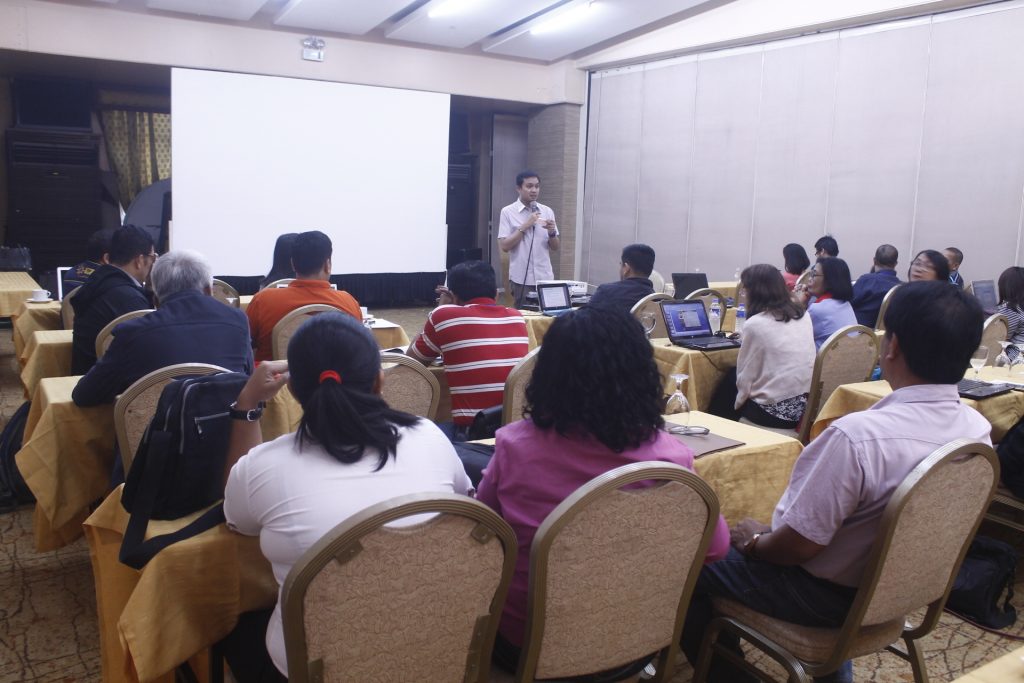
PRDP, gov’t line agencies converge to beef up investments in agri commodities
What are good plans for if they are not funded and implemented?
The DA-PRDP South Luzon Project Support Office (PSO) walks the talk with its recently concluded workshop for mainstreaming Provincial Commodity Investment Plans (PCIPs) in the plans and budgets of national and regional government line agencies.
Representatives from forty-two local government units (LGUs) and regional line agencies of DA and other government institutions in CALABARZON, MIMAROPA and Bicol gathered on October 24–28 to participate in the said workshop.
During the workshop, investments worth more than P897.42 million were initially pledged by the representatives of various agencies to support the development of priority commodity value chains in the South Luzon Cluster.
The mainstreaming workshop and investment forum facilitated by the PSO’s local and national level planning (I-PLAN) component primarily aimed to include the PCIP’s pump-priming interventions in the 2018 and 2019 plans and budgets of the line agencies.
It also aimed to forge productive linkages with the concerned national government institutions in the operationalization and implementation of PCIPs.
Trailblazing activity
According to PRDP NPCO Planning Specialist Ferdinand Blanco, the PRDP South Luzon Cluster is the first among the other PRDP clusters to facilitate a convergence activity with the government line agencies and mainstream PCIPs in their plans and budgets.
“This activity is a must, because PCIPs are actually convergence documents. The PRDP, however, can fund roughly ten percent of the interventions identified in the PCIPs,” Blanco said.
He added, “If we don’t want the PCIPs to be just another document in the shelf, other agencies should buy-in and implement the necessary interventions based on the PCIPs.”
PRDP South Luzon PSO Director Shandy Hubilla stated that LGUs and government agencies concerned in rural development should come together and discuss to avoid overlapping projects. “We don’t want redundant projects due to lack of coordination. What we want is to maximize, harness our resources,” Hubilla added.

PRDP South Luzon PSO Director Shandy Hubilla delivers his opening remarks during the mainstreaming workshop. (Photo by Ana Francesca Chavez, DA-PRDP PSO South Luzon InfoACE Unit)
Investments from convergence
Initial investments worth P217.53 million for CALABARZON, P185.87 million for MIMAROPA, and P494.02 million for Bicol were committed by the participating line agencies in the development of priority commodities of the cluster.
Engr. Edwin Elloso of the Quezon Provincial Project Management and Implementation Unit (PPMIU) was thankful for the workshop’s positive impact to the province.
He said, “Syempre masarap sa pakiramdam na hindi na sosolohin ng probinsya yung mga gastos sa projects. Malaking bagay sa amin ang convergence na ’yan. (It is certainly pleasing to know that the budget for the identified projects will not be solely shouldered by the province. The converge is a big help.)”
Director Hubilla cited Oriental Mindoro as one of the best performing LGUs in the Cluster in terms of the operationalization and mainstreaming of PCIP.
The province has established and continues to strengthen its partnership with funding agencies such as the Department of the Interior and Local Government (DILG), Bureau of Soils and Water Management (BWSM), Department of Trade and Industry (DTI), and the Department of Science and Technology (DOST) aside from DA-PRDP. Through the investments from the said agencies into Oriental Mindoro’s calamansi value chain, the province’s calamansi industry is on the rise.
Commitments of LGUs and Line Agencies
Engr. Elloso was positive that the convergence with other agencies will be continuous. He shared the PPMIU’s plans to mainstream their PCIPs with the endorsements of the Provincial and Regional Development Councils.
According to Engr. Elloso some of the commitments of the various agencies to the Quezon Province included the provision of seedlings, farm equipment, and technical assistance, among others.
For Carlos Hagoshos, Bicol Regional Port Manager of the Philippine Fisheries Development Authority (PFDA), the workshop helped him disseminate relevant information about the mandates of and services offered by PFDA.
Through the workshop, Hagoshos also became more aware of PRDP and the other agencies present. He said that there seem to be a disconnect among agencies, but the PRDP convergence workshop is “a good exercise.”
The role of PRDP I-PLAN
Rey Lara, PRDP South Luzon PSO I-PLAN Component Head, said, “We will not stop on this workshop, because our goal is for the identified interventions to be funded.” He added, “We don’t want these plans to be just plans. We really want to have them implemented.”
The I-PLAN component will engage the respective heads and directors of the concerned agencies and discuss with them the initial outputs from the workshop until talks about program contracts begin.
Blanco hoped that the workshop initiated by the South Luzon Cluster will be replicated by the other clusters. He added that lessons from previous foreign-assisted projects have been learned. According to him, when the said projects were completed and the release of funds also stopped, the useful processes and skills derived from those programs also disappeared. “That’s why we have to mainstream and institutionalize the processes and tools of PRDP, so that the LGUs will still make use of them even after PRDP ends,” Blanco said.
The Cluster’s I-PLAN component assisted 16 provinces including two cities to have their PCIPs updated and endorsed by the Provincial and City Development Councils. Instead of having private value chain analysis (VCA) consultants, the PSO guided and mobilized the Regional Project Coordination Offices and PPMIUs to craft 42 VCAs of which 25 are already issued with No Objection Letter.
According to Lara, the PCIP, which is a strategic plan that sets the development interventions for the identified priority commodities, is a vehicle towards regional convergence initiatives that will advance the agri-fishery sector. ### (Gumamela Celes Bejarin, DA-PRDP PSO South Luzon InfoACE Unit)
